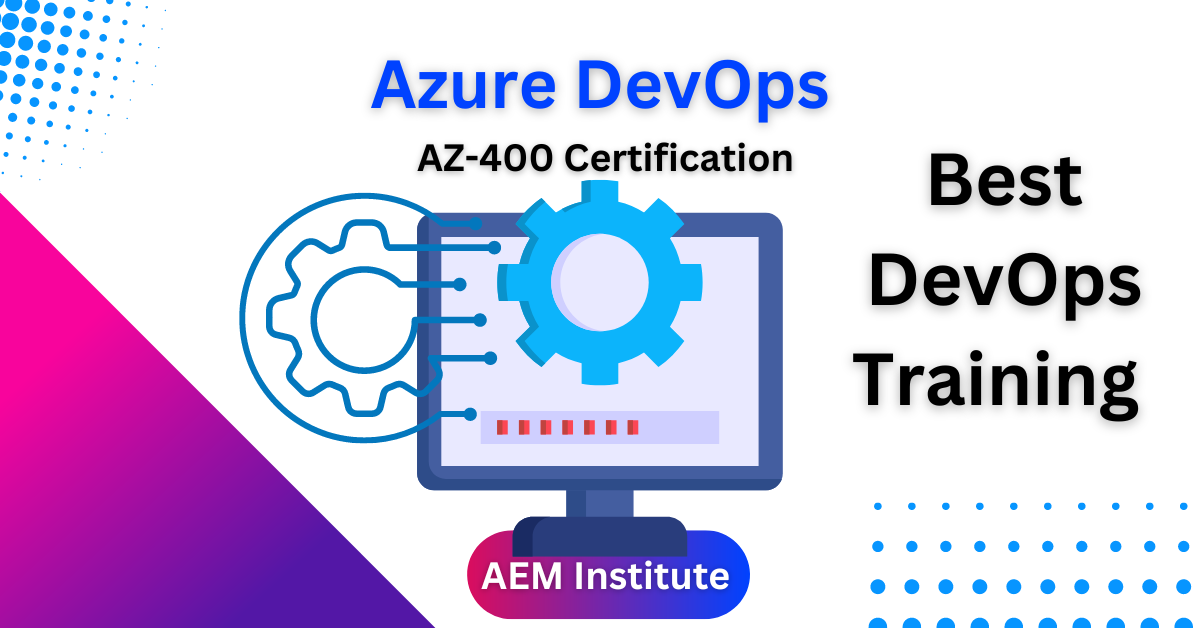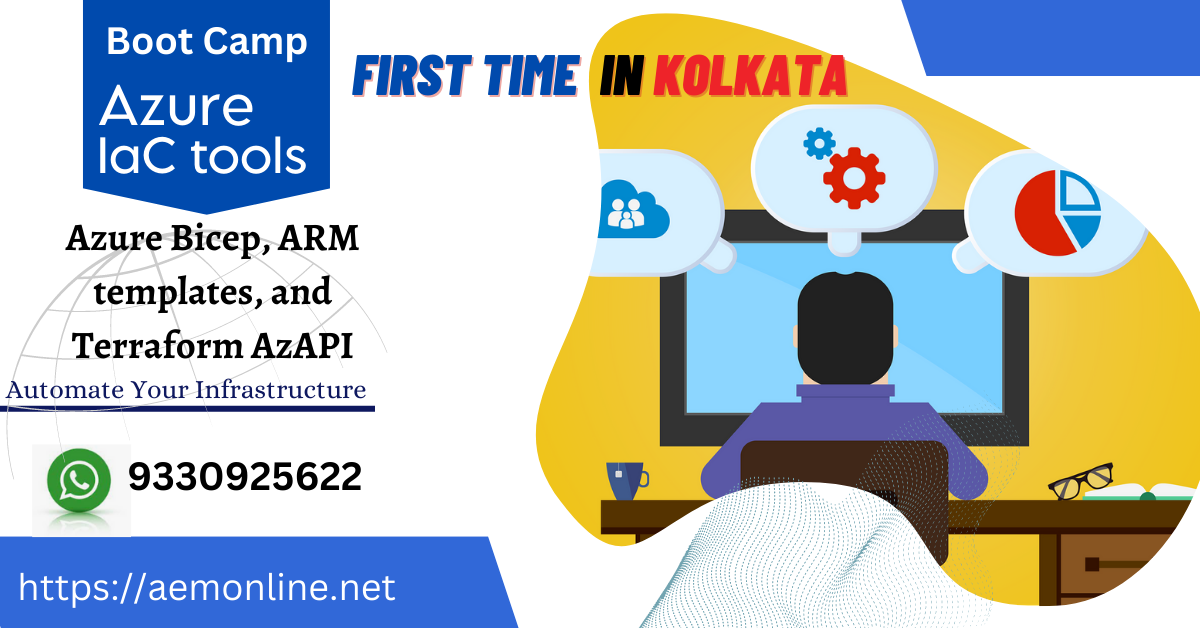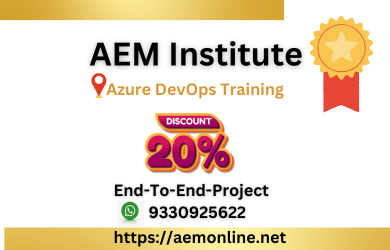Azure DevOps Training in Hyderabad for AZ-400 Certification Course
AEM Institute is One Of The Best Azure DevOps Training Institute in Hyderabad, Telangana for AZ-400 Certification course in Lower Cost with High quality hands-on online training. We provide end-to-end project based training and cv rewriting assistance with a special interview preparation session completely free for every learner.
Azure DevOps Training in Hyderabad - Course Introduction
Are you looking for a hands-on project based Azure DevOps Training in Hyderabad? Do you need to pass Azure DevOps AZ-400 Certification in Hyderabad with confidence? Then you are at right place. AEM Institute provides best project based hands-on Online Azure DevOps Training in Hyderabad, Telangana with high success rate. We have students from different locations in and around Hyderabad like Ameerpet, Dilsukhnagar, Kukarpally, S R Nagar etc. All Azure DevOps Training Batches are conducted online in WeekEnd and WeekDays in different slots. It is a complete interactive Instructor led 2-way online training where every student participates in Labs, discussions and question answer sessions. Students from different engineering colleges and IT Sectors in Hyderabad choose Azure DevOps online Training class. In our Azure DevOps Az-400 course we teach devops tools like GitHub, Azure Repo, Jenkins, Docker, Kubernetes on Azure (AKS) which is known as Azure Kubernetes Service and Terraform. Apart from training we also provide a guided project on DevOps.
Microsoft Azure DevOps Certification in Hyderabad for the AZ-400 Certification course offers a complete end-to-end course for DevOps with Lower and affordable course fees. This is the most suitable DevOps Course for learners willing to join as a DevOps Engineer with best salary packages in Cloud and DevOps Industry. Learners in AZ-400 certification training in Hyderabad with AEM Institute will get Free Tutorials and exam preparation resources for Azure Fundamental AZ-900 Certification as an added benefit with this course. Apart from that all materials for DevOps Interview Preparation provided completely free for every learner which help them to get best DevOps Jobs with high Salary Packages. Our Alumni secured 7.8L to 19L PA Salary Packages with 3 to 8 years of Working Experience as a DevOps Engineer having proper IT education background.

The course is designed by Microsoft and delivered by our Experienced DevOps Consultants who will demonstrate and help you to learn all the modules in-depth to make you clear the Microsoft Azure DevOps Certification AZ-400 exam and become a certified Azure DevOps Engineer. In this course, our trainers will make you proficient in version control, Jenkins, Azure DevOps Dashboard, IaC with Terraform, Creating build and release pipeline and all other relevant tools and technologies. The Azure DevOps Training cost in Hyderabad is INR 19,800 and discounts applicable time to time if available. This is the 30% lower fees for Azure DevOps Training in Hyderabad than other Institutes. You may contact AEM Institute for ongoing discounts for Azure Certification Training and Exam Vouchers.
To become Microsoft Certified: DevOps Engineer Expert you have to complete any one prerequisite:
- Microsoft Certified: Azure Administrator Associate
- Microsoft Certified: Azure Developer Associate
What you will get in AZ-400 Certification Training?
AEM Students are working globally ..
RedHat | TCS | Wipro | CTS | Accenture | Deloitte | Amazon | PWC | Ericsson and many more.....
Who can Join Azure DevOps Training in AEM?
- Network Administrators
- System Administrators
- Project Managers
- Consultants
- Anyone interested in learning Azure Cloud Computing
Tools you will learn in Azure DevOps Training in Hyderabad:
Topics covered in Azure DevOps Training course in Hyderabad:
- analyze existing artifact (e.g. deployment packages, NuGet) and container repositories
- analyze existing test management tools
- analyze existing work management tools
- recommend migration and integration strategies for artifact repositories, source control, test management, and work management
- identify and recommend project metrics, KPIs, and DevOps measurements (e.g. cycle time, lead time, Azure Kubernetes Service, WIP limit)
- implement tools and processes to support Agile work management
- mentor team members on Agile techniques and practices
- recommend an organization structure that supports scaling Agile practices
- recommend in-team and cross-team collaboration mechanisms
- Integrating Distributed Architecture with EC2 hosted app server and S3 as backend store
- analyze existing quality environment
- identify and recommend quality metrics
- recommend a strategy for feature flag lifecycle
- recommend a strategy for measuring and managing technical debt
- recommend changes to team structure to optimize quality
- recommend performance testing strategy
- inspect and validate code base for compliance
- inspect and validate infrastructure for compliance
- recommend a secure development strategy
- recommend tools and practices to integrate code security validation (e.g. static code analysis)
- recommend tools and practices to integrate infrastructure security validation
- design a license management strategy (e.g. VSTS users, concurrent pipelines, test environments, open source software licensing, DevOps tools and services, package management licensing)
- design a strategy for end-to-end traceability from work items to working software
- design a strategy for integrating monitoring and feedback to development teams
- design an authentication and access strategy
- design a strategy for integrating on-premises and cloud resources
- recommend branching models
- recommend version control systems
- recommend code flow strategy
- integrate external source control
- integrate source control into third-party continuous integration and continuous deployment (CI/CD) systems
- implement private and hosted agents
- integrate third party build systems
- recommend strategy for concurrent pipelines
- manage Azure pipeline configuration (e.g. agent queues, service endpoints, pools, webhooks)
- implement pull request strategies
- implement branch and fork strategies
- configure branch policies
- manage mobile target device sets and distribution groups
- manage target UI test device sets
- provision tester devices for deployment
- Exam Preparation
- create public and private distribution groups
- implement a secure and compliant development process
- implement general (non-secret) configuration data
- manage secrets, tokens, and certificates
- implement applications configurations (e.g. Web App, Azure Kubernetes Service, containers)
- implement secrets management (e.g. Web App, Azure Kubernetes Service, containers, Azure Key Vault)
- implement tools for managing security and compliance in the pipeline
- monitor code quality
- configure build to report on code coverage
- manage automated test quality
- manage test suites and categories
- monitor quality of tests
- integrate security analysis tools (e.g. SonarQube, WhiteSource Bolt, Open Web Application Security Project)
- create deployable images (e.g. Docker, Azure Container Registry)
- analyze and integrate Docker multi-stage builds
- design build triggers, tools, integrations, and workflow
- implement a hybrid build process
- implement multi-agent builds
- recommend build tools and configuration (e.g. Azure Pipelines, Jenkins)
- set up an automated build workflow
- recommend release tools
- identify and recommend release approvals and gates
- recommend strategy for measuring quality of release and release process
- recommend strategy for release notes and documentation
- select appropriate deployment pattern
- automate inspection of health signals for release approvals by using release gates
- configure automated integration and functional test execution
- create a release pipeline (e.g. Azure Kubernetes Service, Service Fabric, WebApp)
- create multi-phase release pipelines
- integrate secrets with release pipeline
- provision and configure environments
- manage and modularize tasks and templates (e.g. task and variable groups)
- implement blue-green deployments
- implement canary deployments
- implement progressive exposure deployments
- scale a release pipeline to deploy to multiple endpoints (e.g. deployment groups, Azure Kubernetes Service, Service Fabric)
- recommend artifact management tools and practices (Azure Artifacts, npm, maven, Nuget)
- abstract common packages to enable sharing and reuse
- inspect codebase to identify code dependencies that can be converted to packages
- identify and recommend standardized package types and versions across the solution
- refactor existing build pipelines to implement version strategy that publishes packages
- recommend artifact management tools and practices (Azure Artifacts, npm, maven, Nuget)
- abstract common packages to enable sharing and reuse
- inspect codebase to identify code dependencies that can be converted to packages
- identify and recommend standardized package types and versions across the solution
- refactor existing build pipelines to implement version strategy that publishes packages
- analyze existing and future hosting infrastructure
- analyze existing Infrastructure as Code (IaC) technologies
- design a strategy for managing technical debt on templates
- design a strategy for using transient infrastructure for parts of a delivery lifecycle
- design a strategy to mitigate infrastructure state drift
- create nested resource templates
- manage secrets in resource templates
- provision Azure resources
- recommend an Infrastructure as Code (IaC) strategy
- recommend appropriate technologies for configuration management (ARM Templates, Terraform, Chef, Puppet, Ansible)
- provision Azure Kubernetes Service (e.g. using ARM templates, CLI)
- create deployment file for publishing to Azure Kubernetes Service (e.g. kubectl, Helm)
- develop a scaling plan
- implement compliance and security scanning
- prevent drift by using configuration management tools
- automate configuration management by using PowerShell Desired State Configuration (DSC)
- automate configuration management by using a VM Agent with custom script extensions
- set up an automated pipeline to inspect security and compliance
- design practices to measure end-user satisfaction (e.g. Send a Smile, app analytics)
- design processes to capture and analyze user feedback from external sources (e.g. Twitter, Reddit, Help Desk)
- design routing for client application crash report data
- recommend monitoring tools and technologies
- recommend system and feature usage tracking tools
- configure crash report integration for client applications
- develop monitoring and status dashboards
- implement routing for client application crash report data
- implement tools to track system usage, feature usage, and flow
- integrate and configure ticketing systems with development team's work management system (e.g. IT Service Management connector, ServiceNow Cloud Management, App Insights work items)
- analyze alerts to establish a baseline
- analyze telemetry to establish a baseline
- perform live site reviews and capture feedback for system outages
- perform ongoing tuning to reduce meaningless or non-actionable alerts

Some Tips for getting Azure DevOps Job in Hyderabad:
AZURE DevOps Training in Ameerpet, Dilsukhnagar, Kukarpally, S R Nagar Hyderabad - Upcoming Class Schedule:
| Start Date | Class Timing | Course Fees | Course Duration |
|---|---|---|---|
| 9th July 2023 | 10am-1pm [Week End] | INR19,950 | Four Months |
| 17th July 2023 | 9am-11pm [Mon To Fri] | INR19,950 | One Month |
| 30th July 2023 | 10am-1pm [Week End] | INR19,950 | Four Months |
| 8th August 2023 | 8pm-10pm [Tue & Thu] | INR19,950 | Two Months |
| 21st August 2023 | 8pm-10pm [Mon & Fri] | INR19,950 | Two Months |
Need more Help? Feel Free to contact us - 

Other Popular Azure Courses in Hyderabad from AEM Institute :
- Azure Administrator AZ-104 Certification
- Azure Solutions Architect AZ-305 Certification
- Azure Data Engineer DP-203 Certification
- Azure AI Engineer AI-102 Certification
- AZ-900 Certification Training is free with any above Training
What are the Benefits of Learning Azure DevOps AZ-400 Certification in Hyderabad with AEM?
- DevOps is quite a very new concept in the industry and more and more companies are deploying DevOps practices.
- You learn to work in a team consisting of cross-functional team members—QA, developers, operation engineers, and business analysts with Azure DevOps Certification Training.
- Azure DevOps Engineer training is equipped with all the needed expertise that are required in all phases of product development life cycle. Organizations are also training their existing staff as well in DevOps to fill any skill gaps.
- The average starting salary of a Azure DevOps Engineer is expected to be around 7.5 Lakhs per Annum to 9.7 Lakhs per annum. This keeps increasing as one gains expertise and experience in Azure DevOps.
- Azure DevOps experts should be able to adopt to the new tools as well as with the advanced technologies and growing needs of business.
Azure DevOps Az-400 Training FAQs
AWS DevOps certification is focused on skill sets in the AWS platform. This certification is ideal for individuals who want to specialize in AWS-based DevOps practices and tools and having projects in AWS Cloud in their organization.
So it is the choice of an individual assessing the career goals and the specific requirements of their organization. As per career if you have previous experience for working in microsoft technologies and products in projects it is sugested to learn Azure DevOps AZ-400 certification.

